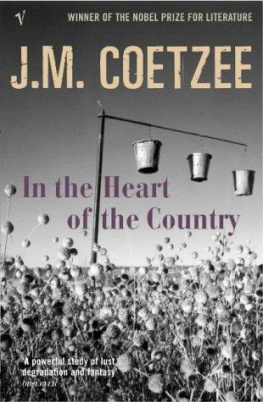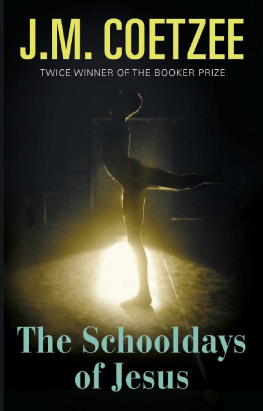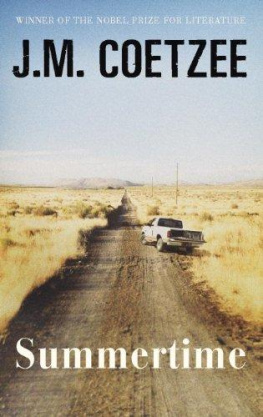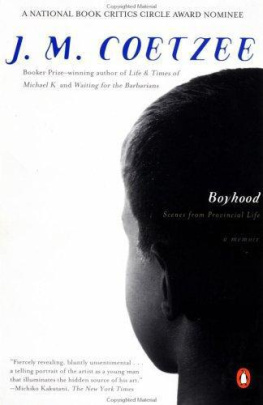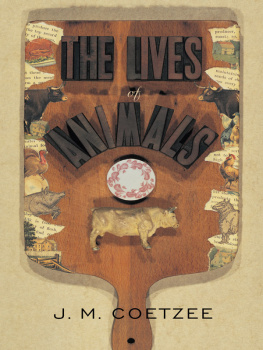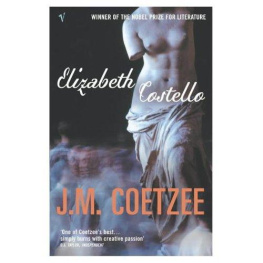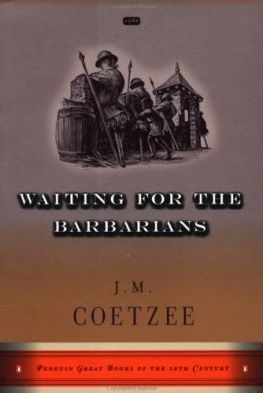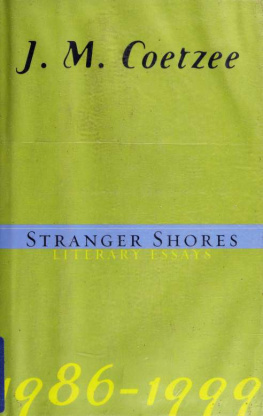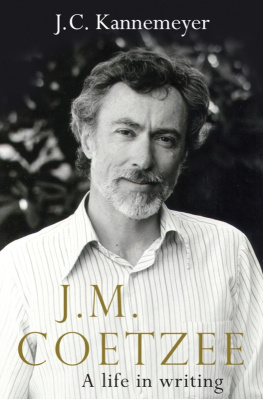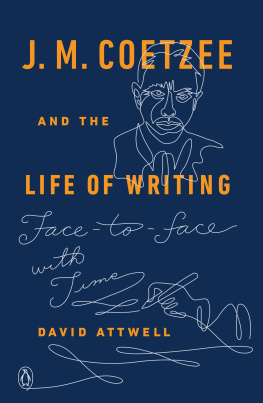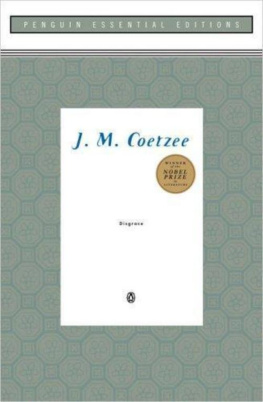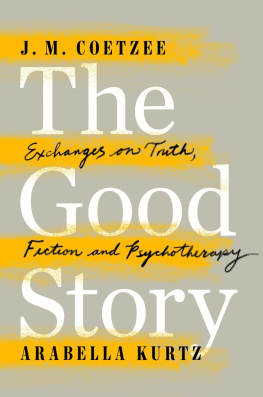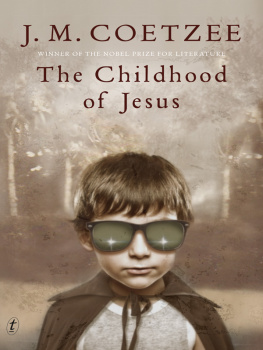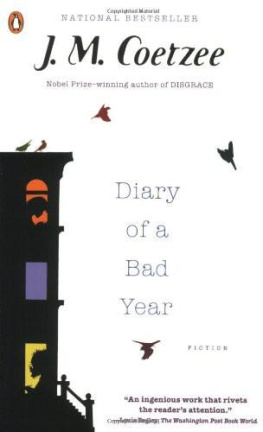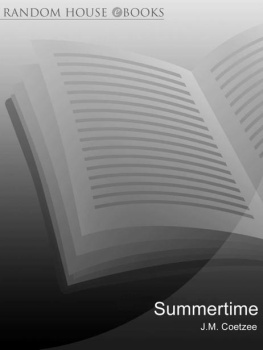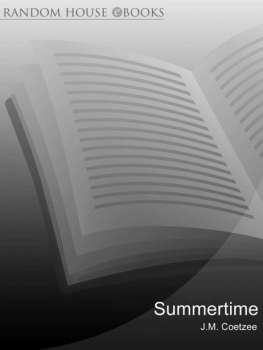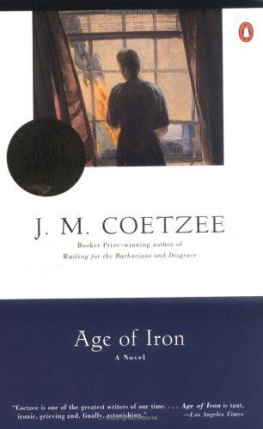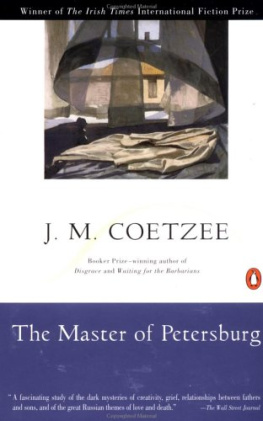J. M. Coetzee - In the Heart of the Country
Here you can read online J. M. Coetzee - In the Heart of the Country full text of the book (entire story) in english for free. Download pdf and epub, get meaning, cover and reviews about this ebook. year: 1977, genre: Detective and thriller. Description of the work, (preface) as well as reviews are available. Best literature library LitArk.com created for fans of good reading and offers a wide selection of genres:
Romance novel
Science fiction
Adventure
Detective
Science
History
Home and family
Prose
Art
Politics
Computer
Non-fiction
Religion
Business
Children
Humor
Choose a favorite category and find really read worthwhile books. Enjoy immersion in the world of imagination, feel the emotions of the characters or learn something new for yourself, make an fascinating discovery.
- Book:In the Heart of the Country
- Author:
- Genre:
- Year:1977
- Rating:4 / 5
- Favourites:Add to favourites
- Your mark:
- 80
- 1
- 2
- 3
- 4
- 5
In the Heart of the Country: summary, description and annotation
We offer to read an annotation, description, summary or preface (depends on what the author of the book "In the Heart of the Country" wrote himself). If you haven't found the necessary information about the book — write in the comments, we will try to find it.
In the Heart of the Country — read online for free the complete book (whole text) full work
Below is the text of the book, divided by pages. System saving the place of the last page read, allows you to conveniently read the book "In the Heart of the Country" online for free, without having to search again every time where you left off. Put a bookmark, and you can go to the page where you finished reading at any time.
Font size:
Interval:
Bookmark:
J.M. Coetzee
In the Heart of the Country
1. Today my father brought home his new bride. They came clip-clop across the flats in a dog-cart drawn by a horse with an ostrich-plume waving on its forehead, dusty after the long haul. Or perhaps they were drawn by two plumed donkeys, that is also possible. My father wore his black swallowtail coat and stovepipe hat, his bride a wide-brimmed sunhat and a white dress tight at waist and throat. More detail I cannot give unless I begin to embroider, for I was not watching. I was in my room, in the emerald semi-dark of the shuttered late afternoon, reading a book or, more likely, supine with a damp towel over my eyes fighting a migraine. I am the one who stays in her room reading or writing or fighting migraines. The colonies are full of girls like that, but none, I think, so extreme as I. My father is the one who paces the floorboards back and forth, back and forth In his slow black boots. And then, for a third, there is the new wife, who lies late abed. Those are the antagonists.
2. The new wife. The new wife is a lazy big-boned voluptuous feline woman with a wide slow-smiling mouth. Her eyes are black and shrewd like two berries, two shrewd black berries. She is a big woman with fine wrists and long plump tapering fingers. She eats her food with relish. She sleeps and eats and lazes. She sticks out her long red tongue and licks the sweet mutton-fat, from her lips. "Ah, I like that!" she says, and smiles and rolls her eyes. I watch her mouth, mesmerized. Then she turns on me the wide smiling mouth and the shrewd, black eyes. I cannot easily sustain her smile. We are not a happy family together.
3. She is the new wife, therefore the old one is dead. The old wife was my mother, but died so many years ago that I barely recall her. I must have been very young when she died, perhaps only a newborn babe. From one of the farthest oubliettes of memory I extract a faint grey image, the image of a faint grey frail gentle loving mother huddled on the floor, one such as any girl in my position would be likely to make up for herself.
4. My father's first wife, my mother, was a frail gentle loving woman who lived and died under her husband's thumb. Her husband never forgave her for failing to bear him a son. His relentless sexual demands led to her death in childbirth. She was too frail and gentle to give birth to the rough rude boy-heir my father wanted, therefore she died. The doctor came too late. Summoned by a messenger on a bicycle, he had to come trundling along forty miles of farm-track in his donkey-cart. When he arrived my mother already lay composed on her deathbed, patient, bloodless, apologetic.
5. (But why did he not come on horseback? But were there bicycles in those days?)
6. I was not watching my father bear his bride home across the flats because I was in my room in the dark west wing eating my heart out and biding my time. I should have been standing ready to greet them with smiles and offers of tea, but I was not. I was absent. I was not missed. My father pays no attention to my absence. To my father I have been an absence all my life. Therefore instead of being the womanly warmth at the heart of this house I have been a zero, null, a vacuum towards which all collapses inward, a turbulence, muffled, grey, like a chill draft eddying through the corridors, neglected, vengeful.
7. Night falls, and my father and his new wife cavort in the bedroom. Hand in hand they stroke her womb, watching for it to flicker and blossom. They twine; she laps him in her flesh; they chuckle and moan. These are fair times for them.
8. In a house shaped by destiny like an H I have lived all my life, in a theatre of stone and sun fenced in with miles of wire, spinning my trail from room to room, looming over the servants, the grim, widow-daughter of the dark father. Sundown after sundown, we have faced each other over the mutton, the potatoes, the pumpkin, dull food cooked by dull hands. Is it possible that we spoke? No, we could not have spoken, we must have fronted each other in silence and chewed our way through, time, our eyes, his black eyes and my black eyes inherited from him, roaming blank across their fields of vision. Then, we have retired to sleep, to dream allegories of baulked desire such, as we are blessedly unfitted to interpret; and in the mornings vied in icy asceticism to be the earlier afoot, to lay the fire in the cold grate. Life on the farm.
9. In the shadowy hallway the clock ticks away day and night. I am the one who keeps it wound and who weekly, from sun and almanac, corrects it. Time on the farm is the time of the wide world, neither a jot nor a tittle more or less, Resolutely I beat down the blind, subjective time of the heart, with its spurts of excitement and drags of tedium: my pulse will throb with the steady one-second beat of civilization. One day some as yet unborn scholar will recognize in the clock the machine that has tamed the wilds. But will he ever know the desolation of the hour of the siesta, chiming in cool green high-ceilinged houses where the daughters of the colonies lie counting with their eyes shut? The land is full of melancholy spinsters like me, lost to history, blue as roaches in our ancestral homes, keeping a high shine on the copperware and laying in jam. Wooed when we were little by our masterful fathers, we are bitter vestals, spoiled for life. The childhood rape: someone should study the kernel of truth in this fancy.
10. I live, I suffer, I am here. With cunning and treachery, if necessary, I fight against becoming one of the forgotten ones of history. I am a spinster with a locked diary but I am more than that. I am an uneasy consciousness but I am more than that, too. When all the lights are out I smile in the dark. My teeth glint, though no one would believe it.
11. She comes up behind me, a waft of orange-blossom and rut, and takes me by the shoulders. "I do not want you to be angry, I understand that you should feel disturbed and unhappy, but there is no cause for it. I would like us all to be happy together. I will do anything, truly anything, to make that come about. Can you believe me?"
I stare into the chimney-recess; my nose swells and reddens.
"I want to make a happy household," she croons, circling, "the three of us together. I want you to think of me as a sister, not an enemy."
I watch the full lips of this glutted woman.
12. There was a time when I imagined that if I talked long enough it would be revealed to me what it means to be an angry spinster in the heart of nowhere. But though I sniff at each anecdote like a dog at its doo, I find none of that heady expansion into the as if that marks the beginning of a true double life. Aching to form the words that will translate me into the land of myth and hero, here I am still my dowdy self in a dull summer heat that will not transcend itself. What do I lack? I weep and gnash my teeth. Is it mere passion? Is it merely a vision of a second existence passionate enough to carry me from the mundane of being into the doubleness of signification? Do I not quiver at every pore with a passion of vexation? Is it that my passion lacks will? Am I an angry yet somehow after all complacent farmyard spinster, wrapped in the embrace of my furies? Do I truly wish to get beyond myself? The story of my rage and its dire sequel: am I going to climb into this vehicle and close my eyes and be carried downstream, over the rapids, through the broken water, to wake refreshed on the quiet estuary? What automatism is this, what liberation is it going to bring me, and without liberation what is the point of my story? Do I feel rich outrage at my spinster fate? Who is behind my oppression? You and you, I say, crouching in the cinders, stabbing my finger at father and stepmother. But why have I not run away from them? As long as an elsewhere exists where I can lead a life, there are heavenly fingers pointing at me too. Or am I, hitherto unbeknown to me, but now alas known, reserved for a more complex fate: to be crucified head downward as a warning to those who love their rage and lack all vision of another tale? But what other tale is there for me? Marriage to the neighbour s second son? I am not a happy peasant. I am a miserable black virgin, and my story is my story, even if it is a dull black blind stupid miserable story, ignorant of its meaning and of all its many possible untapped happy variants. I am I. Character is fate. History is God. Pique, pique, pique.
Next pageFont size:
Interval:
Bookmark:
Similar books «In the Heart of the Country»
Look at similar books to In the Heart of the Country. We have selected literature similar in name and meaning in the hope of providing readers with more options to find new, interesting, not yet read works.
Discussion, reviews of the book In the Heart of the Country and just readers' own opinions. Leave your comments, write what you think about the work, its meaning or the main characters. Specify what exactly you liked and what you didn't like, and why you think so.

